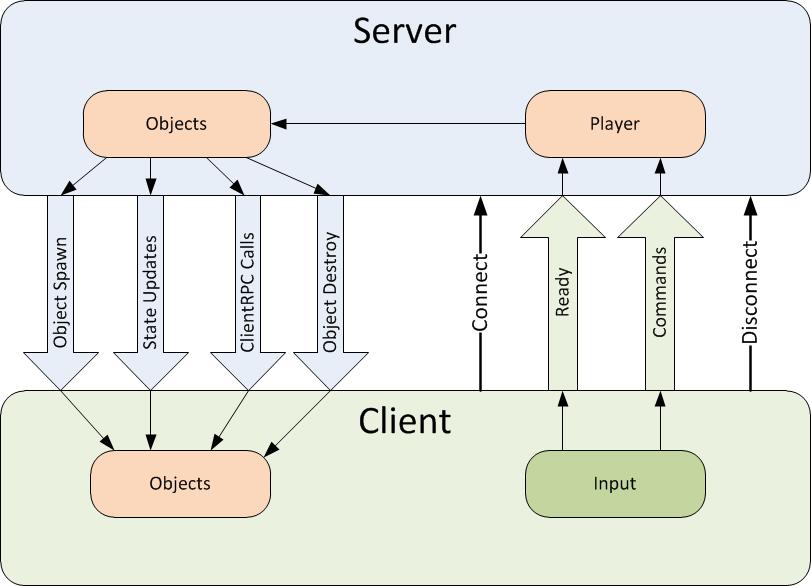Network Behaviour
See also NetworkBehaviour in the API Reference.
Network Behaviour scripts work with game objects that have a NetworkIdentity component. These scripts can perform high-level API functions such as ServerRpcs, ClientRpcs, and SyncVars.
With the server-authoritative system of Mirage, the server must use the NetworkServer.Spawn function to spawn game objects with Network Identity components. Spawning them this way assigns them a netId and creates them on clients connected to the server.
Note: This is not a component that you can add to a game object directly. Instead, you must create a script that inherits from NetworkBehaviour (instead of the default MonoBehaviour), then you can add your script as a component to a game object.
NetworkBehaviour scripts have the following features:

Note: NetworkBehaviors in Mirror and in UNet provide virtual functions as a way for you to add logic in response to lifecycle events. Mirage does not, instead add listeners to the events in NetworkIdentity.
Synchronized variables
Your component can have data that is automatically synchronized from the server to the client. You can use SyncVars as well as SyncLists, SyncHashSet, and SyncDictionary inside a NetworkBehaviour. They will be automatically propagated to the clients whenever their value changes in the server.
Server and Client functions
You can tag member functions in NetworkBehaviour scripts with custom attributes to designate them as server-only or client-only functions. ServerAttribute will check that the function is called in the server. Likewise, ClientAttribute will check if the function is called in the client.
For more information, see Attributes.
Server RPC Calls
To execute code on the server, you must use Server RPC calls. The high-level API is a server-authoritative system, so ServerRpc is the only way for a client to trigger some code on the server.
Only player game objects can send ServerRpcs.
When a client player game object sends a ServerRpc, that ServerRpc runs on the corresponding player game object on the server. This routing happens automatically, so it is impossible for a client to send a ServerRpc for a different player.
To define a Server RPC Call in your code, your function must have a ServerRpc attribute.
Server RPC Calls are called just by invoking the function normally on the client. Instead of the ServerRpc function running on the client, it is automatically invoked on the corresponding player game object on the server.
Server RPC Calls are type-safe, have built-in security and routing to the player, and use an efficient serialization mechanism for the arguments to make calling them fast.
See Server RPC and related sections for more information.
Client RPC Calls
Client RPC calls are a way for server game objects to make things happen on client game objects.
Client RPC calls are not restricted to player game objects and may be called on any game object with a Network Identity component.
To define a Client RPC call in your code, your function must have a ClientRpc attribute.
See Client RPC and related sections for more information.
Network Callbacks
Callbacks can be used to make sure code is executed at the right time.
The network callbacks are found inside NetworkIdentity so they can also be used outside of a NetworkBehaviour.
See NetworkBehaviour Callbacks and related sections for more information.